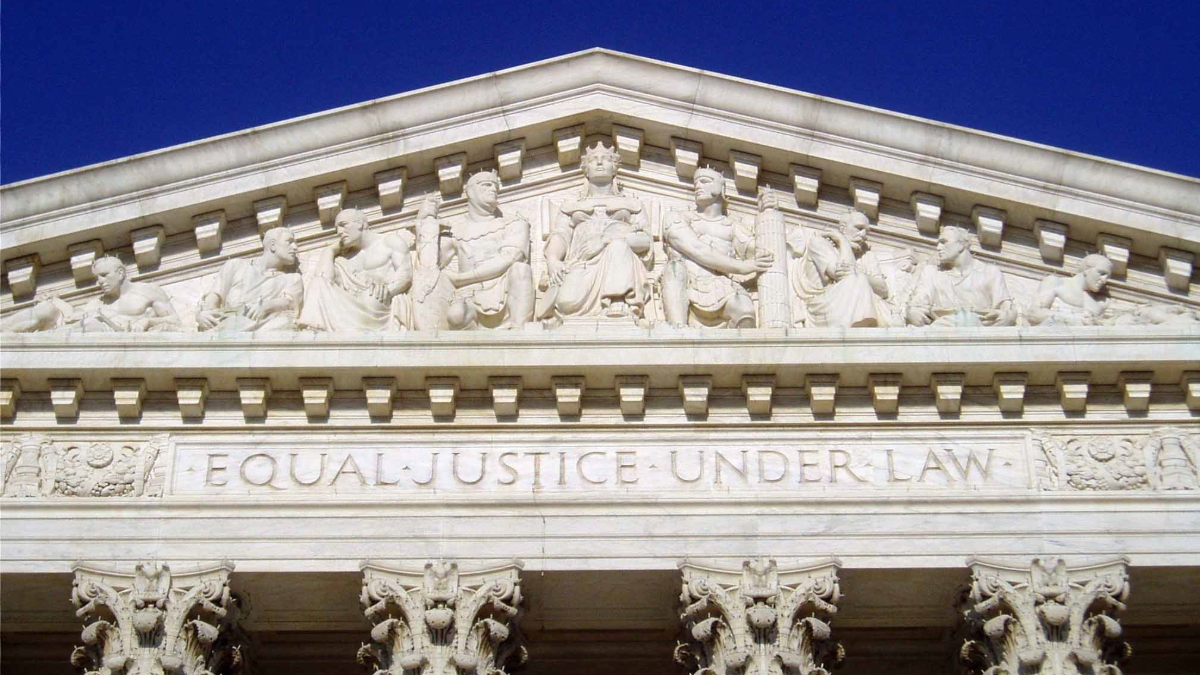Reactions to the US Supreme Court's TikTok Ruling
Prithvi Iyer / Jan 18, 2025
The inscription Equal Justice Under Law as seen on the frieze of the United States Supreme Court building in Washington DC. Matt Wade/Wikimedia CC BY-SA 3.0
On Friday, the US Supreme Court delivered its order upholding the constitutionality of the Protecting Americans from Foreign Adversary Controlled Applications Act, a law passed by Congress and signed by President Joe Biden in April 2024. The ruling affirmed the decision of the United States Circuit Court of Appeals for the District of Columbia. The Court found that the Act, which effectively bans TikTok in the US unless its Chinese parent company, ByteDance, sells it, does not violate the First Amendment rights of TikTok, its users, or creators.
Following the order, civil society organizations and experts shared a range of reactions. Tech Policy Press is collecting some of them here.
Jameel Jaffer, Executive Director, Knight First Amendment Institute
TikTok’s future will turn on politics, not on today’s ruling by the Supreme Court. But make no mistake, by allowing the ban to go into effect, the Supreme Court has weakened the First Amendment and markedly expanded the government’s power to restrict speech in the name of national security. Its implications for TikTok may be limited, but the ruling creates the space for other repressive policies in the future.
Read the full statement here.
Liana Keesing, Campaigns Manager for Technology Reform, Issue One
In a broad bipartisan vote last year, Congress passed legislation to address the serious national security concerns associated with TikTok and to protect Americans’ sensitive personal data. That law, which was signed into law by President Biden, was upheld today by the highest court in the land. The United States now has a constitutional responsibility to enforce this law.
The First Amendment guarantees freedom of speech, but it does not protect social media platforms or foreign adversaries that want to undermine our democracy. The Supreme Court rightfully recognized these facts. We cannot allow the Chinese Communist Party to weaponize the sensitive data of 170 million Americans or influence U.S. public opinion and manipulate algorithms to propagate the Chinese government’s own interests among American users.
Read the full statement here.
Nicole Gill, Executive Director and Co-Founder, Accountable Tech
Although social media is a tool for connection, community, and exploration, it is also a weapon for mass disinformation, manipulation, and addiction. For years now, China has had this weapon pointed at millions of Americans through TikTok, with profound power to collect vast amounts of data and potentially exploit how Americans receive information. But they are not alone: Meta and other U.S. companies use similar tactics to addict and exploit their users – including young people – in this country and around the world.
Since our inception, Accountable Tech has focused on dismantling the toxic business model at the root of Big Tech’s societal harms. While today’s decision represents a seemingly expedient solution to rid our country of this foreign interference in our information ecosystem, it is not a long-term solution to address the ability of any tech company to addict our people, exploit our data, and undermine our sovereignty. We implore our elected officials to enact structural reforms on all online platforms that cement our privacy, prioritize our safety, and ensure our freedom.
Read the full statement here.
Daniel Castro, Vice President, Information Technology and Innovation Foundation (ITIF) and Director of ITIF's Center for Data Innovation
Following the Supreme Court’s decision to uphold the ban, TikTok’s fate now lies with President-elect Trump and Congress. However, the debate around restricting TikTok is like focusing on a single tree while ignoring the whole forest. By singling out one app, policymakers are missing the larger issue: A digital ecosystem where Chinese-owned apps operate freely in the United States, even as American apps are systematically blocked in China. While it is possible to mitigate security threats from individual Chinese-owned apps on a case-by-case basis, the U.S. urgently needs a coherent economic policy to address the deeper imbalance in digital market access.
The narrow focus on TikTok has distracted from the need for the United States to develop a consistent and comprehensive policy to address broader economic risks from one-sided market access by Chinese tech companies. It’s troubling that policymakers only seem willing to act against China in the techno-economic space by invoking security threats or human rights abuses when they should instead be willing to directly address the systematic economic mercantilism and lack of reciprocity that define the current digital market. To truly protect U.S. interests, policymakers should turn the page on the debate over TikTok, examine the entire framework of Chinese digital engagement, and demand a fair and reciprocal digital playing field.
Read the full statement here.
Yanni Chen, Policy Counsel, Free Press
The Supreme Court didn’t just get it wrong today — the decision is a troubling dereliction of the Court’s duty to uphold our Constitution. Protecting the First Amendment rights of the 170 million Americans who use TikTok every day to access news, information and entertainment must take priority over the unproven national-security concerns raised in this case. And while the ruling holds that the law does not, on its face, regulate speech ‘because of the messages or ideas being conveyed,’ this Court ignored the extensive record showing that Congress aimed to do just that.
The government should not violate the First Amendment rights of TikTok creators and users because of unsubstantiated, abstract fears around national security. Our First Amendment jurisprudence does not, and should not, work that way. Singling out TikTok in this way fails to solve the urgent problem plaguing Americans’ digital lives and ignores the rest of an entire business sector dedicated to continuously harvesting our data and then selling it to the highest bidders in the United States and abroad.
Read the full statement here.
Thomas Berry, Director of the Center for Constitutional Studies, Cato Institute
The Supreme Court’s per curiam opinion is explicitly cautious in its language, and the Court clearly hopes that this opinion doesn't become a foundational precedent, given its rushed nature. In choosing to apply only intermediate scrutiny, the Court was too deferential to the government’s claim that this law should not be treated as a “speaker-based” speech restriction that triggers strict scrutiny. The Court accepted the government’s argument that there are speech-neutral reasons for a law to single out TikTok, but there is plenty of evidence in the legislative record that TikTok was targeted because of the speech on the platform. And the rushed nature of this litigation meant that the courts did not have a sufficient evidentiary record to assure themselves that any data-privacy concerns relevant to TikTok are truly unique.
It is at least reassuring that the Court relied only on the government’s data-privacy rationale and did not accept the government's argument that it has an interest in changing the content-moderation choices on TikTok. But like the D.C. Circuit below, the Court was all too willing to accept the government’s say-so rather than demand hard evidence that TikTok poses a unique danger. A law singling out and banning a particular speaker by name requires much more judicial scrutiny and skepticism than what the Court gave it today.
Read the full statement here.
Jenna Leventoff, Senior Policy Counsel, ACLU
Taking away Americans’ free speech rights does not make us safer; it endangers our democracy. The next administration must immediately work with Congress to fix or repeal this flawed legislation. No one should be stripped of their ability to express themselves, especially on a platform that brings together such an immense, vibrant collection of voices from around the world.
Read the full statement here.
Rep. John R. Moolenar (R-MI), Chairman of the House Select Committee on the Strategic Competition Between the United States and the Chinese Communist Party
This is a pivotal moment for the future of TikTok. The Supreme Court has upheld a law that requires applications owned by our foreign adversaries to be sold in order to operate in the US – and ruled it to be constitutional. This rule is not a ban on TikTok. It is a pathway to a safer, better TikTok. This is the first step – now it is time to make the deal of the century.
Read the full statement here.
Jacob Huebert, Director, Liberty Justice Center
We are disappointed that the Court would uphold such a sweeping restriction on Americans’ right to free speech—especially based on speculative ‘national security’ arguments that the government backed with minimal evidence. But the Court’s ruling today is at least narrow—it relies on the unique relationship between TikTok and its foreign parent, and it doesn’t opine on the parts of the law that would allow future presidents to ban other platforms they believe threaten national security. In addition, President Trump has recognized the dangerous precedent this ban sets, and we hope he will follow through with his stated intention to reach a deal to save the platform.
Read the full statement here.
Foundation for Individual Rights and Expression (FIRE)
Our unique national commitment to freedom of expression requires more caution than today’s ruling delivers. The unprecedented ban of a communication platform used by 170 million Americans demands strict judicial scrutiny, not the rushed and highly deferential review the Supreme Court instead conducted. The Court explicitly notes the “inherent narrowness” of today’s decision. FIRE will hold it to that promise, and fight to contain the threat the ruling poses to our First Amendment rights.
Read the full statement here.
Rushan Abbas, Executive Director, Campaign for Uighurs
This decision is a strong step taken by the U.S. government to protect its citizens. As Uyghurs, we have firsthand experience with the CCP’s weaponization of mobile data to track, surveil, and oppress our people. Recognizing the threats, we advocate to ensure that the American people are safeguarded from similar risks.
Read the statement here.
David Greene, Civil Liberties Director, Electronic Frontier Foundation
We are deeply disappointed that the Court failed to require the strict First Amendment scrutiny required in a case like this, which would’ve led to the inescapable conclusion that the government's desire to prevent potential future harm had to be rejected as infringing millions of Americans’ constitutionally protected free speech. We are disappointed to see the Court sweep past the undisputed content-based justification for the law – to control what speech Americans see and share with each other – and rule only based on the shaky data privacy concerns.
Read the full statement here.
Authors
